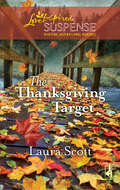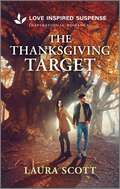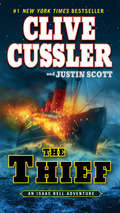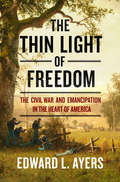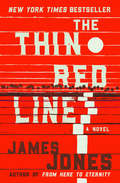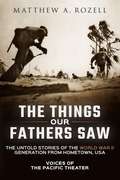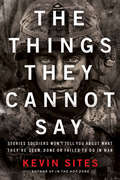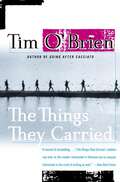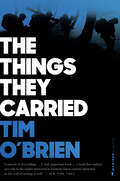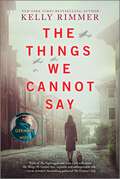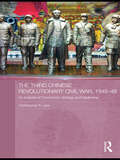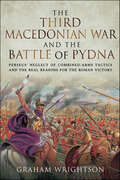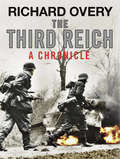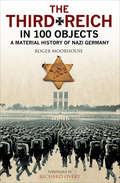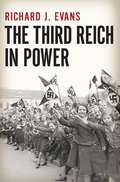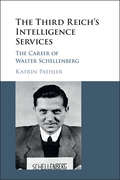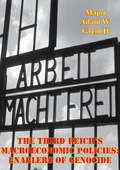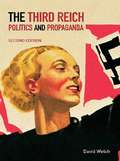- Table View
- List View
The Thanksgiving Target
by Laura ScottA soldier home for the holidays is brought together with a woman in need of protection in this romantic suspense novel of faith, danger, and family.Army lieutenant Max Forrester is home on leave, and looking forward to celebrating Thanksgiving with his sister. Instead, he finds Melissa in the hospital after a brutal attack. With help from Melissa’s social worker, Tara Carmichael, Max is determined to keep his sister safe. But then he discovers that Tara is facing dangers of her own . . .With a stalker making threats, Tara has been praying for strength. And Max might just be the answer to her prayers. But protecting both women won’t be easy . . . especially when the stalker’s true target is revealed.
The Thanksgiving Target: A Riveting Holiday Thriller
by Laura ScottA soldier's homecoming is interrupted when he finds himself caught up in a game of cat and mouse between the woman he wants to protect and the stalker bent on putting her in harm's way. Don't miss this thrilling romantic suspense from USA Today bestselling author Laura Scott.When Army lieutenant Max Forrester comes home on leave, he finds his sister Melissa in the hospital after a brutal attack. With help from Melissa&’s social worker, Tara Carmichael, Max is determined to keep his sister safe. But then he discovers that Tara is facing dangers of her own when her house explodes. Now it&’s up to Michael to keep both women safe. But as he and Tara work together to uncover her stalker&’s identity, a shocking discovery could mean the end for them all…Previously published.
The Theory and Practice of Irregular Warfare: Warrior-scholarship in counter-insurgency (Studies in Insurgency, Counterinsurgency and National Security)
by Andrew Mumford and Bruno C. ReisThis book offers an analysis of key individuals who have contributed to both the theory and the practice of counterinsurgency (COIN). Insurgencies have become the dominant form of armed conflict around the world today. The perceptible degeneration of the occupations of Iraq and Afghanistan into insurgent quagmires has sparked a renewal of academic and military interest in the theory and practice of counterinsurgency. In light of this, this book provides a rigorous analysis of those individuals who have contributed to both the theory and practice of counterinsurgency: ‘warrior-scholars’. These are soldiers who have bridged the academic-military divide by influencing doctrinal and intellectual debates about irregular warfare. Irregular warfare is notoriously difficult for the military, and scholarly understanding about this type of warfare is also problematic; especially given the residual anti-intellectualism within Western militaries. Thus, The Theory and Practice of Irregular Warfare is dedicated to analysing the best perceivable bridge between these two worlds. The authors explore the theoretical and practical contributions made by a selection of warrior-scholars of different nationalities, from periods ranging from the French colonial wars of the mid-twentieth century to the Israeli experiences in the Middle East; from contributions to American counter-insurgency made during the Iraq War, to the thinkers who shaped the US war in Vietnam. This book will be of much interest to students of counterinsurgency, strategic studies, defence studies, war studies and security studies in general.
The Thief (An Isaac Bell Adventure #5)
by Clive Cussler Justin ScottAn invention that could change the world... A ruthless agent that could destroy it... Only Isaac Bell can save it. On the ocean liner Mauretania, two European scientists with a groundbreaking new invention are rescued from abduction by the Van Dorn Detective Agency's intrepid chief investigator, Isaac Bell. Unfortunately, they are not so lucky when one of the thugs attacks a second time. What are the scientists holding that is so precious? Something that will revolutionize business and world culture--and perhaps something more. For war clouds are looming, and a ruthless espionage agent has spotted an opportunity to give the German Empire an edge in the coming conflict. It's up to Isaac Bell to figure out who he is, what he's up to, and stop him. But Bell may already be too late.
The Thin Light of Freedom: The Civil War And Emancipation In The Heart Of America
by Edward L. AyersWinner of the Lincoln Prize A landmark Civil War history told from a fresh, deeply researched ground-level perspective. At the crux of America’s history stand two astounding events: the immediate and complete destruction of the most powerful system of slavery in the modern world, followed by a political reconstruction in which new constitutions established the fundamental rights of citizens for formerly enslaved people. Few people living in 1860 would have dared imagine either event, and yet, in retrospect, both seem to have been inevitable. In a beautifully crafted narrative, Edward L. Ayers restores the drama of the unexpected to the history of the Civil War. He does this by setting up at ground level in the Great Valley counties of Augusta, Virginia, and Franklin, Pennsylvania, communities that shared a prosperous landscape but were divided by the Mason-Dixon Line. From the same vantage point occupied by his unforgettable characters, Ayers captures the strategic savvy of Lee and his local lieutenants, and the clear vision of equal rights animating black troops from Pennsylvania. We see the war itself become a scourge to the Valley, its pitched battles punctuating a cycle of vicious attack and reprisal in which armies burned whole towns for retribution. In the weeks and months after emancipation, from the streets of Staunton, Virginia, we see black and white residents testing the limits of freedom as political leaders negotiate the terms of readmission to the Union. Ayers deftly shows throughout how the dynamics of political opposition drove these momentous events, transforming once unimaginable outcomes into fact. With analysis as powerful as its narrative, here is a landmark history of the Civil War.
The Thin Red Line: The Thin Red Line (The World War II Trilogy #2)
by James JonesWith &“shattering prose,&” the New York Times–bestselling author of From Here to Eternity captures the intense combat in the battle of Guadalcanal (San Francisco Chronicle). In August of 1942 the first American marines charged Guadalcanal, igniting a six-month battle for two thousand square miles of jungle and sand. In that gruesome stretch sixty thousand Americans made the jump from boat to beach, and one in nine did not return. James Jones fought in that battle, and The Thin Red Line is his haunting portrait of men and war. The soldiers of C-for-Charlie Company are not cast from the heroic mold. The unit&’s captain is too intelligent and sensitive for the job, his first sergeant is half mad, and the enlisted men begin the campaign gripped by cowardice. Jones&’s moving portrayal of the Pacific combat experience stands among the great literature of World War II. This ebook features an illustrated biography of James Jones including rare photos from the author&’s estate.
The Things Our Fathers Saw: Voices of the Pacific Theater
by Matthew A. RozellThis book brings you the previously untold firsthand accounts of combat and brotherhood, of captivity and redemption, and the aftermath of a war that left no American community unscathed.
The Things They Cannot Say: Stories Soldiers Won't Tell You about What They've Seen, Done or Failed to Do in War
by Kevin SitesWhat is it like to kill? What is it like to be under fire? How do you know what's right? What can you never forget? In The Things They Cannot Say, award-winning journalist and author Kevin Sites asks these difficult questions of eleven soldiers and marines, who--by sharing the truth about their wars--display a rare courage that transcends battlefield heroics. For each of these men, many of whom Sites first met while in Afghanistan and Iraq, the truth means something different. One struggles to recover from a head injury he believes has stolen his ability to love; another attempts to make amends for the killing of an innocent man; yet another finds respect for the enemy fighter who tried to kill him. Sites also shares the unsettling narrative of his own failures during war--including his complicity in a murder--and the redemptive powers of storytelling that saved him from a self-destructive downward spiral.
The Things They Carried
by Tim O'BrienThey carried malaria tablets, love letters, mine detectors, dope, each other. And if they made it home alive, they carried unrelenting images of a nightmarish war in South Vietnam. <p><i>(Page numbers included.)</i>
The Things They Carried
by Tim O'BrienA classic work of American literature that has not stopped changing minds and lives since it burst onto the literary scene, The Things They Carried is a ground-breaking meditation on war, memory, imagination, and the redemptive power of storytelling. The Things They Carried depicts the men of Alpha Company: Jimmy Cross, Henry Dobbins, Rat Kiley, Mitchell Sanders, Norman Bowker, Kiowa, and the character Tim O'Brien, who has survived his tour in Vietnam to become a father and writer at the age of forty-three. Taught everywhere--from high school classrooms to graduate seminars in creative writing--it has become required reading for any American and continues to challenge readers in their perceptions of fact and fiction, war and peace, courage and fear and longing. The Things They Carried won France's prestigious Prix du Meilleur Livre Etranger and the Chicago Tribune Heartland Prize; it was also a finalist for the Pulitzer Prize and the National Book Critics Circle Award.
The Things We Cannot Say: A WWII Historical Fiction Novel
by Kelly RimmerOVER 1 MILLION COPIES SOLD!The New York Times bestseller—for fans of All the Light We Cannot See and The Tattooist of Auschwitz!From the bestselling author of Truths I Never Told You, Before I Let You Go, and the The Warsaw Orphan, Kelly Rimmer&’s powerful WWII novel follows a woman&’s urgent search for answers to a family mystery that uncovers truths about herself that she never expected.&“Fans of The Nightingale and Lilac Girls will adore The Things We Cannot Say.&” —Pam Jenoff, New York Times bestselling authorIn 1942, Europe remains in the relentless grip of war. Just beyond the tents of the refugee camp she calls home, a young woman speaks her wedding vows. It&’s a decision that will alter her destiny…and it&’s a lie that will remain buried until the next century.Since she was nine years old, Alina Dziak knew she would marry her best friend, Tomasz. Now fifteen and engaged, Alina is unconcerned by reports of Nazi soldiers at the Polish border, believing her neighbors that they pose no real threat, and dreams instead of the day Tomasz returns from college in Warsaw so they can be married. But little by little, injustice by brutal injustice, the Nazi occupation takes hold, and Alina&’s tiny rural village, its families, are divided by fear and hate.Then, as the fabric of their lives is slowly picked apart, Tomasz disappears. Where Alina used to measure time between visits from her beloved, now she measures the spaces between hope and despair, waiting for word from Tomasz and avoiding the attentions of the soldiers who patrol her parents&’ farm. But for now, even deafening silence is preferable to grief.Slipping between Nazi-occupied Poland and the frenetic pace of modern life, Kelly Rimmer creates an emotional and finely wrought narrative. The Things We Cannot Say is an unshakable reminder of the devastation when truth is silenced…and how it can take a lifetime to find our voice before we learn to trust it. For more by Kelly Rimmer, look for Before I Let You Go Truths I Never Told You The Warsaw Orphan The German Wife The Paris Agent The Midnight Estate
The Things We Do to Make It Home
by Beverly GologorskyAn emotionally charged story of passionate love, unfulfilled desire, and an American dream gone totally awry, Beverly Gologorsky's poignant, unadorned novel lays bare the destructive impact of the Vietnam War on the wives, lovers, and children of veterans. This haunting story of devotion and loss will speak to anyone who has suffered the effects of an unwinnable war.
The Third Chinese Revolutionary Civil War, 1945-49: An Analysis of Communist Strategy and Leadership (Asian States and Empires)
by Christopher R. LewThis book examines the Third Chinese Revolutionary Civil War of 1945–1949, which resulted in the victory of the Chinese Communist Party (CCP) over Chiang Kaishek and the Guomindang (GMD) and the founding of The People’s Republic of China in 1949. It provides a military and strategic history of how the CCP waged and ultimately won the war, the transformation its armed forces and how the Communist leadership interacted with each other. Whereas most explanations of the CCP’s eventual victory focus on the Sino-Japanese War of 1937–45, when the revolution was supposedly won as a result of the communists’ invention of "peasant nationalism", this book shows that the outcome of the revolution was not a foregone conclusion in 1945. It explains how the eventual victory of the communists resulted from important strategic decisions taken on both sides, in particular the remarkable transformation of the communist army from an insurgent / guerrilla force into a conventional army. The book also explores how the hierarchy of The People’s Republic of China developed during the war. It shows how Mao’s power was based as much on his military acumen as his political thought, above all his role in formulating and implementing a successful military strategy in the war of 1945–49. It also describes how other important figures, such as Lin Biao, Deng Xiaoping, Nie Rongzhen, Liu Shaoqi and Chen Yi, made their reputations during the conflict; and reveals the inner workings of the first political-military elite of the PRC. Overall, this book is an important resource for anyone seeking to understand the origins and early history of The People’s Republic of China, the Chinese Communist Party and the People’s Liberation Army.
The Third Day at Gettysburg and Beyond
by Gary W. GallagherThe six essays in this volume testify to the enduring impact of the Civil War on our national consciousness. Covering subjects as diverse as tactics, the uses of autobiography, and the power of myth-making in the southern tradition, they illustrate the rewards of imaginative scholarship--even for the most intensely studied battle in America's history. The Third Day at Gettysburg and Beyond brings current research and interpretation to bear on a range of pivotal issues surrounding the final day of the battle, July 3, 1863. This revisionist approach begins by expanding our knowledge of the engagement itself: individual essays address Confederate general James Longstreet's role in Pickett's Charge and Union general George Meade's failure to pursue Lee after the fighting. Other essays widen the scope of investigation to look at contemporary reactions to the Confederate defeat across the South, the construction of narratives by the participants themselves--from Confederate survivors of Pickett's assault to Union sergeant Ben Hirst--and the reverberations of Pickett's final momentous charge. Combining fresh evidence with the reinterpretation of standard sources, these essays refocus our view of the third day at Gettysburg to take in its diverse stories of combat and memory. The contributors are Gary W. Gallagher, William Garrett Piston, Carol Reardon, Robert K. Krick, Robert L. Bee, and A. Wilson Greene.
The Third Indochina War: Conflict between China, Vietnam and Cambodia, 1972-79 (Cold War History #Vol. 11)
by Odd Arne Westad Sophie Quinn-JudgeThis new collection explores the origins and key issues of the Third Indochina War, which began in 1979. Drawing on unique documentation from all sides, leading contributors reinterpret and demystify the long-term and immediate causes of the Vietnamese-Cambodian and Sino-Vietnamese conflicts. They closely examine how both the links between policies and policy assumptions in the countries involved, and the dynamics - national, regional and international - drove them towards war. Rather than explaining the conflicts as determined by age-old resentments and suspicions or seeing war between the former allies as the necessary outcome of the conflicts of the 1970s, the contributors to this volume look at the concrete causes for the breakdown in cooperation and the road to war. This volume includes even-handed assessments of the roles of the major players, including a look at the beginnings of Thai-Chinese military cooperation in support of the Khmer Rouge. The subjects covered remain highly relevant to inter-state relations in South East Asia, where border issues are still a cause of tension. An updated chronology of events leading to the outbreak of hostilities is also included. This book will be of immense interest to all students of the Third Indochina War, Southeast Asian history and of international relations and war studies in general.
The Third Macedonian War and Battle of Pydna: Perseus' Neglect of Combined-arms Tactics and the Real Reasons for the Roman Victory
by Graham Wrightson“…provides general audiences with a serviceable history of the Third Macedonian War and an overview of Macedonian military institutions in the Hellenistic Era.” - The Journal of Military History The Third Roman-Macedonian War was a disaster for Macedon, a defeat leading to the end of that kingdom's independence. This is usually attributed to an innate superiority of the Roman legionary tactics over the Macedonian system. Graham Wrightson, on the other hand, argues that the blame lies entirely with Perseus, the last king of Macedon. He analyzes the whole war, following the primary source accounts and focusing on Perseus’ military decisions and his battlefield strategies. It confirms the prevailing view of the sources that Perseus was too hesitant and non-committal in his early conduct of the war. More significantly it argues that Perseus mishandled the Macedonian army when it comes to combined-arms tactics by adopting a defensive posture, particularly at the final battle of Pydna. The Macedonian military system based on a slow sarissa phalanx is suited entirely to an offensive battle plan coordinating a frontally irresistible phalanx in the centre and a rapid heavy cavalry attack on one wing. Most importantly, though, Perseus refused to spend money to hire 10,000 Gallic horsemen and the lack of cavalry cost him the initiative and the victory. This is a fascinating and thoroughly researched study of these dramatic events that adds fresh insight to the question of the legion's supposed supremacy over the phalanx.
The Third Reich
by Richard OveryThe Third Reich was the name Hitler and the Nazi Party gave to the dictatorship that began in 1933 and ended twelve years later with the utter destruction of Germany and Hitler's suicide. Defined by the messianic, iconic figure of the Führer, the Third Reich was one of the pivotal periods of the modern age. From small beginnings in the 1920s, Hitler's movement came to dominate German society in the 1930s, bringing with it the militarization of German society, the apparatus of state terror and a policy of violent discrimination against political opponents, the so-called "asocials": gypsies, homosexuals, and, above all, the Jews. The history of the Reich is bound up with territorial aggression, total war and genocide. The end result was the complete defeat of Germany and the annihilation of millions of Europeans, a historical drama without precedent that still lies as a shadow over modern-day Germany.Richard Overy charts the rise and fall of Nazi power in a compelling narrative of the period, amplified by extensive quotations from documents, letters, diaries and oral testimony, and accompanied by many original and striking images of the era. There are also fact boxes which explore many of the important aspects of the Third Reich in greater detail. Authoritative, informative and sumptuously illustrated, written by a scholar steeped in knowledge of the period, The Third Reich brings the bloody realities of war, conquest and genocide vividly to life. It is an ideal book for anyone fascinated by the stormy history of the twentieth century, World War II and the age of dictators.
The Third Reich in 100 Objects: A Material History of Nazi Germany
by Roger Moorhouse Richard OveryHitler's Third Reich is still the focus of numerous articles, books and films: no conflict of the twentieth century has prompted such interest or such a body of literature.Approaching the canon of World War II literature is a challenge for a general reader but the 100 objects approach is a novel and accessible presentation.This is a compelling, frequently shocking and revelatory guide to the Third Reich that has been collated and presented by two of the world's leading World War II historians.The photographs gathered by Roger Moorhouse and Roger Moorhouse include Pervitin, Hitler's Mercedes, Wehrmach toilet paper, Hitler's grooming kit, the Nuremberg courtroom, the Tiger Tank, fragments of flak, the Iron Cross and, of course, the Swastika and Mein Kampf.
The Third Reich in Power, 1933-1939
by Richard J. EvansFrom the front flap: THE DEFINITIVE ACCOUNT OF GERMANY'S MALIGN TRANSFORMATION UNDER HITLER'S TOTAL RULE AND THE IMPLACABLE MARCH TO WAR. BY THE MIDDLE OF 1933, the democracy of the Weimar Republic had been transformed into the police state of the Third Reich, mobilized around the cult of the leader, Adolf Hitler. If this could happen in less than a year, what would the future hold? Only the most fervent Nazi party loyalists would have predicted how radical the transformation ahead would be. In The Third Reich in Power, Richard J. Evans tells the story of Germany's radical reshaping under Nazi rule. Every area of life, from literature, culture and the arts to religion, education and science, was subordinated to the relentless drive to prepare Germany for war. His book shows how the Nazis attempted to penetrate and reorder every aspect of German society, encountering many kinds and degrees of resistance along the way, but gradually winning the acceptance of the German people in the long run. Those who were seen as unworthy to be counted among the German people were dealt with in increasingly brutal terms. The Nazi regime took more and more radical measures against the racially "unfit," including Germany's Jews, Gypsies, homosexuals, mentally ill, "asocial" and "habitual" criminals. After six years of foreign policy brinkmanship that took the Nazi regime from success to success, Hitler's drive to prepare Germany for the war that he saw as its destiny reached its fateful hour in September 1939. The war he unleashed was to plunge the world into a maelstrom of genocide and destruction. The Third Reich in Power is the fullest and most authoritative account yet written of how, in six years, Germany was brought to the edge of that terrible abyss.
The Third Reich's Celluloid War: Propaganda in Nazi Feature Films, Documentaries and Television
by Ian GardenThis book exposes the myths surrounding the propaganda films produced during the Third Reich. One, that the Nazis were infallible masters in the use of film propaganda. Two, that everything the Nazis said was a lie. Three, that only the Riefenstahl documentaries are significant to the modern viewer. It reveals the truth, lies, successes and failures of key films designed to arouse hostility against the Nazis’ enemies, including Ohm Krüger - the most anti-British film ever produced; their 1943 anti-capitalist version of Titanic; anti-English films about Ireland and Scotland; and anti-American films like The Emperor of California and The Prodigal Son. Including an objective analysis of all the key films produced by the Nazi regime and a wealth of film stills, Ian C. Garden takes the reader on a journey through the Nazi propaganda machine. In today’s turbulent world the book serves as a poignant reminder of the levels to which powerful regimes will stoop to achieve power and control.
The Third Reich's Intelligence Services
by Katrin PaehlerThis is the first-ever analytical study of Nazi Germany's political foreign intelligence service, Office VI of the Reichssicherheitshauptamt and its head, Walter Schellenberg. Katrin Paehler tells the story of Schellenberg's career in policing and intelligence, charts the development and activities of the service he eventually headed, and discusses his attempts to place it at the center of Nazi foreign intelligence and foreign policy. The book locates the service in its proper pedigree of the SS as well as in relation to its two main rivals - the Abwehr and the Ausw#65533;rtige Amt. It also considers the role Nazi ideology played in the conceptualization and execution of foreign intelligence, revealing how this ideological prism fractured and distorted Office VI's view of the world. The book is based on contemporary and postwar documents - many recently declassified - from archives in the United States, Germany, and Russia.
The Third Reich's Macroeconomic Policies: Enablers Of Genocide
by Major Adam W. Grein IIThe purpose of this study is to identify relationships between Nazi Macroeconomic policy and its ability to enable genocide. This study uses primary source documentation from newspapers, historical documents and published works to examine Nazi ideology as it relates to economics and macroeconomic policy. Accompanying this research is an analysis of steps the United States could have taken to stop or deter Nazi economic policy using the Mass Atrocities Prevention and Response Handbook's economic planning guidance.
The Third Reich: A History of Nazi Germany (Europe Past And Present Ser.)
by Thomas ChildersThe dramatic story of the Third Reich—how Adolf Hitler and a core group of Nazis rose to power and plunged the world into a horrific war, perpetrating the genocidal Holocaust while sacrificing the lives of millions of ordinary Germans.In The Third Reich, Thomas Childers shows how the young Hitler became passionately political and anti-Semitic as he lived on the margins of society. Fueled by outrage at the punitive terms of the Versailles Treaty that ended the Great War, he found his voice and drew a following. As his views developed, Hitler attracted like-minded colleagues who formed the nucleus of the nascent Nazi party. The failed Munich putsch of 1923 and subsequent trial gave Hitler a platform for his views, which he skillfully exploited. Between 1924 and 1929 Hitler and his party languished in obscurity on the radical fringes of German politics, but the onset of the Great Depression provided Hitler the issues he needed to move into the mainstream of German political life. He seized the opportunity to blame Germany’s misery on the victorious allies, the Marxists, the Jews, and big business—and the political parties that represented them. By 1932 the Nazis had become the largest political party in Germany. Although Hitler became chancellor in 1933, his party had never achieved a majority in free elections. Within six months the Nazis transformed a dysfunctional democracy into a totalitarian state and began the inexorable march to World War II and the Holocaust. It is these fraught times that Childers brings to life: the Nazis’ rise to power and their use and abuse of power once they achieved it. Based in part on German documents seldom used by previous historians, The Third Reich charts the dramatic, improbable rise of the Nazis; the suffering of ordinary Germans under Nazi rule; and the horrors of World War II and the Holocaust. This is the most comprehensive and readable one-volume history of Nazi Germany since the classic Rise and Fall of the Third Reich.
The Third Reich: Politics and Propaganda
by David WelchPublished in the year 1994, The Third Reich is a valuable contribution to the field of History.
The Third Sex
by Lawrence R. Schehr Lawrence R. WillyA gold mine of information about a hidden queer culture Thirty-two years before Simone de Beauvoir's classic The Second Sex, popular French novelist Willy published The Third Sex, a vivid description of the world of European homosexuals in France, Italy, and Germany during the late 1920s. Stepping directly into the heart of gay men's culture, Willy follows homosexual nightlife into music halls, nightclubs, casinos, bars, and saunas. While he finds plenty of drug and alcohol abuse, he also discovers homosexual publishers, scientific societies, group rivalries, and opinions--both medical and political--about the nature of homosexuality itself. Lawrence R. Schehr's introduction provides context and translator's notes for this first-ever English edition.
